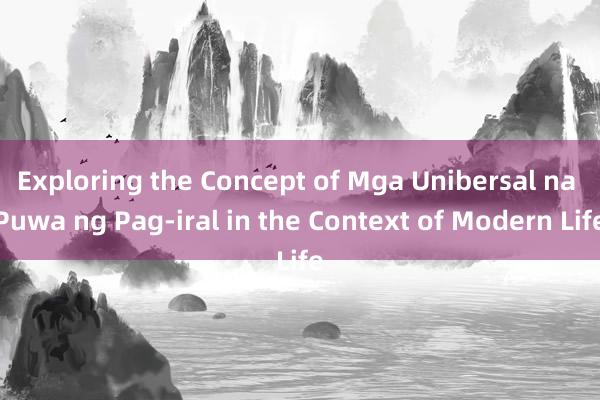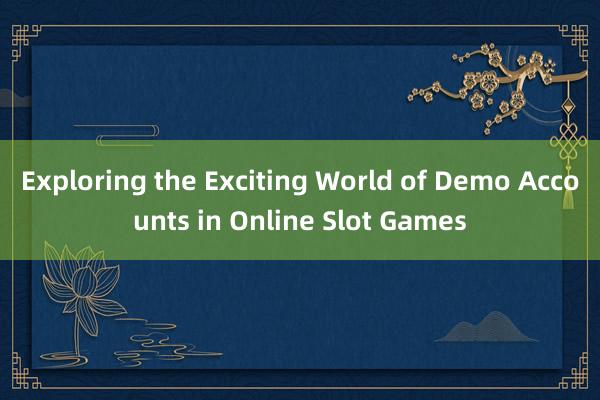Exploring the Concept of Mga Unibersal na Puwa ng Pag-iral in the Context of Modern Life

The Universal Spaces in Human Experience: A Philosophical and Cultural Overview

In the intricate web of human existence, there are certain threads that bind us all together across time, culture, and geography. These connections often transcend the boundaries of individual identity, offering a shared space in which ideas, values, and emotions flow freely. One such concept that has emerged in philosophical, cultural, and even technological discussions is that of the “universal spaces,” or as it is referred to in Filipino, “mga unibersal na puwang.” These are spaces that, whether literal or metaphorical, resonate with people across the globe and form a common ground for human interaction.
Defining "Mga Unibersal na Puwa ng Pag-iral"
The phrase “mga unibersal na puwang” translates roughly to "universal spaces of existence" in English, referring to the shared, accessible spaces in which human life, ideas, and experiences take shape. These spaces may be physical, emotional, or intellectual, and they create an environment where people from diverse backgrounds can connect with one another. From bustling urban centers to vast digital landscapes, universal spaces invite interaction and the exchange of ideas, fostering both individual and collective growth.
The Physical Manifestation of Universal Spaces
Let’s begin by exploring physical universal spaces. Urban cities, for instance, serve as prime examples of these spaces. In every metropolis, there are places that function as cultural hubs, where individuals of varying socioeconomic statuses, nationalities, and belief systems come together. Think of a city square, a public park, or even an airport lounge. These are spaces where people are neither defined by their individual histories nor isolated by cultural barriers. They are spaces of convergence, offering a neutral ground for the everyday interactions that form the backbone of social existence.
For example, in cities such as New York, Tokyo, or Manila, the “universal spaces” might manifest as a café where locals and tourists alike gather, or an open market where both vendor and buyer are equally engaged in commerce, dialogue, and exchange. In these places, there is no one dominant culture; rather, what emerges is a shared experience of belonging, a sense that no one person owns the space—yet everyone plays a part in shaping it.
Digital Spaces: A New Realm of Universality
In the digital age, the concept of universal spaces has taken on an even more profound significance. The internet has transformed the world into a vast, interconnected network of information, ideas, and relationships. Websites, social media platforms, and virtual communities are now the modern equivalent of the physical spaces that were once limited to cities or towns. On platforms like Facebook, Twitter, and Instagram, people from around the world gather, share experiences, and form connections based not on geographic location, but on shared interests, ideologies, and passions.
Here, we can see how universal spaces transcend physical boundaries. An artist in Brazil can collaborate with a musician in South Korea through an online platform, while a student in Kenya can engage in academic discourse with peers from Europe or North America. These digital universal spaces are not confined by national borders or cultural norms—they represent a truly global experience where the rules of space and time are redefined. The internet,chich69 in particular, go88 tài xỉu has democratized the space in ways that were once unimaginable, phim rule 34 providing equal opportunities for individuals to access, participate in, and influence the ongoing dialogue within these virtual spaces.
The Cultural Significance of Shared Spaces
Beyond the physical and digital, “universal spaces” also hold immense cultural significance. These spaces are where human stories are told, histories are shared, and cultures are exchanged. They allow for the creation of what philosopher Emmanuel Levinas called the “face-to-face encounter,” where individuals see one another not as objects or abstract concepts but as living, breathing human beings. In such moments, the universal space becomes not just a point of convergence but a vehicle for mutual understanding and empathy.
Take, for example, the annual events like international film festivals, music concerts, or art exhibitions. These gatherings serve as cultural touchstones that bring together people from diverse backgrounds to experience something that is not bound by national or regional identity. Whether in Cannes, Berlin, or Venice, these festivals create spaces where art and culture become universal languages that transcend barriers of language, ethnicity, and origin. Here, ideas are exchanged freely, and each participant becomes part of a larger narrative that is both personal and collective.
Human Connections: The Bridge Across Divides
In a world marked by increasing polarization, the need for universal spaces is more pronounced than ever. Whether in person or online, these shared spaces offer a bridge across divides—whether those divides are political, ideological, or cultural. They invite people to step outside their silos and engage in authentic dialogue, fostering a deeper sense of understanding and collective responsibility. In these spaces, differences are not erased, but rather celebrated, as the exchange between diverse individuals forms the tapestry of human life.
Such spaces also offer profound opportunities for personal growth and transformation. The exchange of ideas and perspectives in a universal space can challenge long-held assumptions, broaden one’s worldview, and ignite creativity. Consider how many breakthrough innovations in science, technology, and art have emerged from collaborative efforts that took place within these shared environments. Whether it’s the invention of the internet itself or the evolution of social movements, the most significant advancements in human history often take place within universal spaces that allow for open-mindedness, interaction, and the sharing of ideas.
go88 hitThe Transformative Potential of Universal Spaces in Modern Society
The concept of universal spaces is not merely theoretical; it is actively shaping the trajectory of modern society. These spaces are catalysts for creativity, innovation, and change. In this section, we will explore how these spaces function as platforms for personal and collective transformation, and how they are pivotal in addressing the challenges of the 21st century.
Universal Spaces as Incubators of Creativity and Innovation
One of the most powerful ways in which universal spaces influence modern life is by serving as incubators for creativity and innovation. These spaces, where diverse perspectives and ideas converge, provide fertile ground for groundbreaking work. In cities like Silicon Valley, for instance, the physical and intellectual spaces where innovators, entrepreneurs, and tech experts gather are central to the development of cutting-edge technologies. The collaborative atmosphere in these spaces fuels experimentation and creativity, allowing for solutions to emerge that would have been difficult to conceive in more siloed environments.
Similarly, the digital landscape has opened up new opportunities for creative collaboration. Crowdsourcing platforms like Kickstarter and Indiegogo are examples of how the digital space has become a breeding ground for new ideas and ventures. Through these platforms, creators can gain support from a global audience, turning their ideas into viable projects. Moreover, virtual communities allow individuals to share knowledge, critique one another’s work, and collectively refine their creative pursuits. In this way, universal spaces—whether digital or physical—are the crucibles where new forms of artistic expression, technological innovation, and entrepreneurial success are born.
Universal Spaces and Social Movements
In addition to fostering creativity, universal spaces have also played a pivotal role in social movements around the world. Social media platforms, for example, have given rise to global movements that have redefined the possibilities of activism. Movements such as #MeToo, Black Lives Matter, and Fridays for Future have all utilized digital universal spaces to organize, amplify voices, and mobilize people across continents. These platforms not only provide a space for individuals to share their stories but also serve as organizing hubs where collective action can be initiated and sustained.
The power of these universal spaces lies in their ability to amplify voices that might otherwise go unheard. By creating spaces that are open to all, the digital age has empowered marginalized groups to advocate for change, challenge injustices, and engage in meaningful dialogue with the broader public. The result is a more inclusive and dynamic world where social change is not limited by geography or privilege.
Universal Spaces as Tools for Global Cooperation
In an increasingly interconnected world, the challenges we face—whether environmental, economic, or political—are global in nature. The need for global cooperation has never been more pressing. Universal spaces, particularly in the form of international organizations, forums, and networks, offer platforms for collaborative action. Bodies like the United Nations, the World Health Organization, and the International Monetary Fund are just a few examples of spaces where countries come together to address global issues. These spaces allow for dialogue, negotiation, and the sharing of resources and knowledge on a scale that would be impossible without a common platform.
Moreover, universal spaces also foster the growth of transnational movements aimed at tackling issues like climate change, poverty, and inequality. Through international summits, conferences, and digital platforms, activists, policymakers, and everyday citizens can join forces to advocate for sustainable solutions to the world's most pressing problems.
The Future of Universal Spaces
Looking to the future, the evolution of universal spaces will likely continue to shape the contours of global society. With advancements in technology, particularly in the areas of artificial intelligence, virtual reality, and blockchain, we may witness the emergence of entirely new forms of universal spaces—spaces that exist in cyberspace, beyond the physical realm, or even in hybrid forms. These innovations hold the potential to further blur the lines between physical and digital spaces, creating new opportunities for connection, collaboration, and transformation.
However, with these advancements come challenges. As we continue to build these universal spaces, we must also be mindful of issues such as privacy, security, and access. The future of universal spaces should be one that prioritizes inclusivity, equity, and the well-being of all participants. Only then can these spaces continue to serve as true platforms for human connection, creativity, and progress.
Conclusion
In both tangible and intangible ways, universal spaces—mga unibersal na puwang—shape our world. They are the places where humanity converges, collaborates, and creates. From the physical spaces in our cities to the vast digital networks that connect us, these shared spaces are essential for fostering understanding, innovation, and collective action. As we move forward into the future, the challenge will be to ensure that these spaces remain open, inclusive, and conducive to meaningful human interaction. Only then can they fulfill their transformative potential and serve as the foundation for a more connected and harmonious global society.






